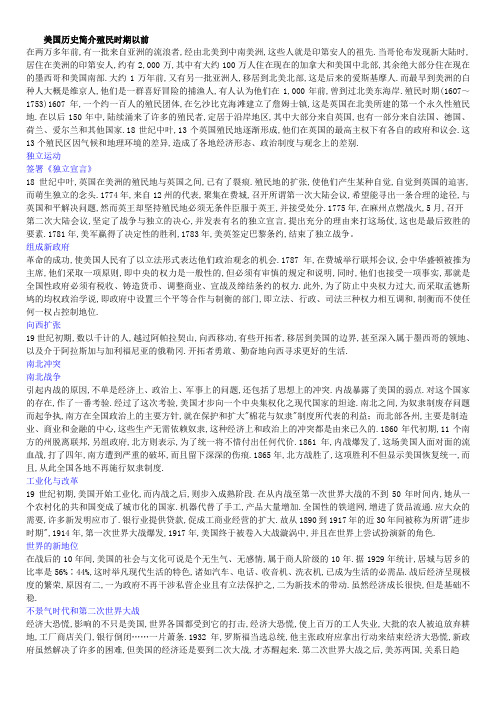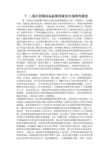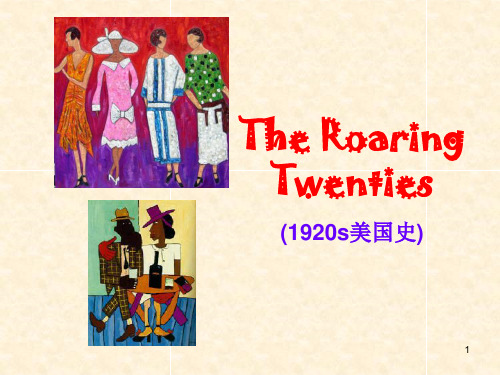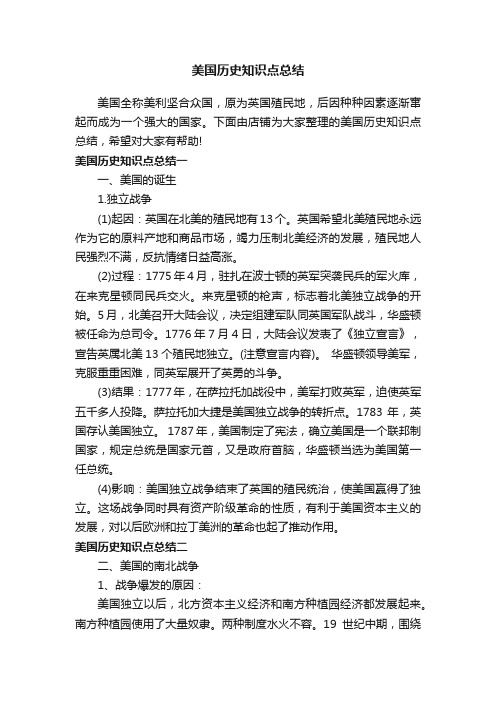战后美国史
战后美国经济发展的“黄金时代”

战后美国经济发展的“黄金时代”自第二次世界大战结束之后的二十年,美国经济经历了一段繁荣的黄金时代。
从1945年到1973年,美国的经济增长速度快速加速,人们的生活水平一步步提高。
让我们来看看这段历史,探究美国经济发展的黄金时代。
一战和二战带来了经济崛起第一和第二次世界大战的影响在美国的经济中产生了重要作用。
一战使得美国成为了全球的工业巨头,因为欧洲各国都在战争中被摧毁了。
二战期间,美国的经济获得了一份最高的荣誉——为盟军提供物资。
此时,美国的产业框架已形成,包括工业、农业和服务业。
二战后,在这些领域中进行了广泛的投资和改进,从而增加了生产力、效率和经济增长。
科技的进步人们还可以归功于科技的进步。
在二战期间,许多重要的科学和技术成果在美国得以发展,如电子、核能和计算机技术。
这些科技的发展不仅为国防和科学研究开辟了道路,同时也有益于其他领域的发展。
马克思主义理论对社会政策产生的影响。
在二战后的几十年,美国的社会政策保持了相对稳定。
确实,战后政策以创造更广泛的经济机会为目标,这与马克思主义对社会及其政策的影响是有关系的。
政策主要关注就业、工资、消费、税收和财政政策。
这些政策的改善推动了美国经济的增长。
资本主义发扬光大以上的因素产生了资本主义制度的发展。
这是因为美国的企业家和投资者在创业和资本市场投资方面表现出了极高的积极性和创新能力,因此推动了经济增长。
1933年《新政》以来,美国资本主义制度逐渐向其中间经济靠拢,从而削弱垄断。
这种市场模式提供了更广泛的机会和更大的市场竞争。
消费主义的兴起消费者信任市场的稳定,支持了市场经济,同时消费主义也开始盛行。
这是推动美国经济增长的一个关键因素,因为购买行为推动制造商继续生产更多产品。
这种购买行为是被广泛的广告宣传所吸引的。
传统上,在过去的几十年里,媒体在促进消费主义上扮演了重要的角色。
总之,20世纪中期的美国是资本主义的黄金时代。
战争和科技的启示、经济政策的改变、创新和创业以及消费主义的崛起都是推动美国经济发展的关键因素。
战后美国发展史

战后美国发展史以史为鉴可以知兴衰,读历史可以使人明智,历史更是前人留给我们的无限瑰宝,所以我选择了这门课作为我的选修课。
作为一名文科生,写文章时引经据典更可以增加文章的可读性。
经过这学期的学习,我觉得我受益匪浅。
我之所以选择战后美国的发展史这个角度,是因为美国在二战后在与苏联冷战结束之后,一跃成为全球霸主,经济更是在全球处于领先地位。
我想仔细研读这段历史,思考它的成功之处,借鉴一些小方面的经验,来丰富自己的阅历。
战后的美国经济并不是呈一条直线,直线上升的。
相反,战后美国的经济经历了一个曲折起伏的发展过程。
通过高中期间学习历史,我已经知道了新科技革命往往能带动经济的飞速发展,而以原子能技术、航空航天技术、电子计算机技术发展为标志的新科技革命的兴起,均是以美国为中心,因此美国经济进入了高度现代化的发展阶段,加上现代企业组织的新发展、国家或国际垄断组织的新发展及跨国公司的迅速崛起,美国开始向后工业社会和信息化社会转变,并始终站在资本主义世界的高峰。
正所谓经济是一国的命脉,所以我的重心放在战后的经济发展。
二战后的美国经济大体可以划分成五个阶段:第一阶段(战后--1973)持续发展期(发展的“黄金时代”)政府加强了对经济的干预;国民经济的军事化极大地刺激了经济的增长(越南战争);战后新技术革命的推动(主要原因);利用战后经济优势地位,大力拓展世界市场(如现代跨国公司的兴起);利用国外廉价资源如石油,极大地获取高额利润;战后国内政治局面的相当稳定。
第二阶段(1974-1982)经济衰退期。
在这期间美国的经济经历了一段时间的衰退,原因种种:经济危机与“滞胀”石油危机、生产停滞、通货膨胀、失业严重、物价上涨等。
根本原因在于资本主义的内在矛盾无法解决(凯恩斯主义的失灵);美国在越战时期采取不恰当的宏观经济政策;第三世界与之利益的冲突与对抗;资本主义之间的竞争与抗衡(日本与西欧的崛起)。
第三阶段(1983-1990)经济持续低速增长、通货膨胀率和失业率显著降低;但债务负担沉重经济政策的调整;现代科技的迅速发展和广泛应用;加强国际合作和政策协调,改善美国商品在国际市场上与日本、西德的竞争地位,增强在国际市场上的竞争力;国际上一些客观有利因素如石油及原料价格的下跌。
美国历史简介

美国历史简介殖民时期以前在两万多年前,有一批来自亚洲的流浪者,经由北美到中南美洲,这些人就是印第安人的祖先.当哥伦布发现新大陆时,居住在美洲的印第安人,约有2,000万,其中有大约100万人住在现在的加拿大和美国中北部,其余绝大部分住在现在的墨西哥和美国南部.大约1万年前,又有另一批亚洲人,移居到北美北部,这是后来的爱斯基摩人.而最早到美洲的白种人大概是维京人,他们是一群喜好冒险的捕渔人,有人认为他们在1,000年前,曾到过北美东海岸.殖民时期(1607~1753)1607年,一个约一百人的殖民团体,在乞沙比克海滩建立了詹姆士镇,这是英国在北美所建的第一个永久性殖民地.在以后150年中,陆续涌来了许多的殖民者,定居于沿岸地区,其中大部分来自英国,也有一部分来自法国、德国、荷兰、爱尔兰和其他国家.18世纪中叶,13个英国殖民地逐渐形成,他们在英国的最高主权下有各自的政府和议会.这13个殖民区因气候和地理环境的差异,造成了各地经济形态、政治制度与观念上的差别.独立运动签署《独立宣言》18世纪中叶,英国在美洲的殖民地与英国之间,已有了裂痕.殖民地的扩张,使他们产生某种自觉,自觉到英国的迫害,而萌生独立的念头.1774年,来自12州的代表,聚集在费城,召开所谓第一次大陆会议,希望能寻出一条合理的途径,与英国和平解决问题,然而英王却坚持殖民地必须无条件臣服于英王,并接受处分.1775年,在麻州点燃战火,5月,召开第二次大陆会议,坚定了战争与独立的决心,并发表有名的独立宣言,提出充分的理由来打这场仗,这也是最后致胜的要素.1781年,美军赢得了决定性的胜利,1783年,美英签定巴黎条约,结束了独立战争。
组成新政府革命的成功,使美国人民有了以立法形式表达他们政治观念的机会.1787年,在费城举行联邦会议,会中华盛顿被推为主席,他们采取一项原则,即中央的权力是一般性的,但必须有审慎的规定和说明,同时,他们也接受一项事实,那就是全国性政府必须有税收、铸造货币、调整商业、宣战及缔结条约的权力.此外,为了防止中央权力过大,而采取孟德斯鸠的均权政治学说,即政府中设置三个平等合作与制衡的部门,即立法、行政、司法三种权力相互调和,制衡而不使任何一权占控制地位.向西扩张19世纪初期,数以千计的人,越过阿帕拉契山,向西移动,有些开拓者,移居到美国的边界,甚至深入属于墨西哥的领地、以及介于阿拉斯加与加利福尼亚的俄勒冈.开拓者勇敢、勤奋地向西寻求更好的生活.南北冲突南北战争引起内战的原因,不单是经济上、政治上、军事上的问题,还包括了思想上的冲突.内战暴露了美国的弱点.对这个国家的存在,作了一番考验.经过了这次考验,美国才步向一个中央集权化之现代国家的坦途.南北之间,为奴隶制废存问题而起争执,南方在全国政治上的主要方针,就在保护和扩大"棉花与奴隶"制度所代表的利益;而北部各州,主要是制造业、商业和金融的中心,这些生产无需依赖奴隶,这种经济上和政治上的冲突都是由来已久的.1860年代初期,11个南方的州脱离联邦,另组政府,北方则表示,为了统一将不惜付出任何代价.1861年,内战爆发了,这场美国人面对面的流血战,打了四年,南方遭到严重的破坏,而且留下深深的伤痕.1865年,北方战胜了,这项胜利不但显示美国恢复统一,而且,从此全国各地不再施行奴隶制度.工业化与改革19世纪初期,美国开始工业化,而内战之后,则步入成熟阶段.在从内战至第一次世界大战的不到50年时间内,她从一个农村化的共和国变成了城市化的国家.机器代替了手工,产品大量增加.全国性的铁道网,增进了货品流通.应大众的需要,许多新发明应市了.银行业提供贷款,促成工商业经营的扩大.故从1890到1917年的近30年间被称为所谓"进步时期",1914年,第一次世界大战爆发,1917年,美国终于被卷入大战漩涡中,并且在世界上尝试扮演新的角色.世界的新地位在战后的10年间,美国的社会与文化可说是个无生气、无感情,属于商人阶级的10年.据1929年统计,居城与居乡的比率是56%∶44%,这时举凡现代生活的特色,诸如汽车、电话、收音机、洗衣机,已成为生活的必需品.战后经济呈现极度的繁荣,原因有二,一为政府不再干涉私营企业且有立法保护之,二为新技术的带动.虽然经济成长很快,但是基础不稳.不景气时代和第二次世界大战经济大恐慌,影响的不只是美国,世界各国都受到它的打击,经济大恐慌,使上百万的工人失业,大批的农人被迫放弃耕地,工厂商店关门,银行倒闭……一片萧条.1932年,罗斯福当选总统,他主张政府应拿出行动来结束经济大恐慌,新政府虽然解决了许多的困难,但美国的经济还是要到二次大战,才苏醒起来.第二次世界大战之后,美苏两国,关系日趋恶化,分别在军事、政治、经济、宣传各方面,加紧准备,一如战时,这种状态,被称为"冷战".美国大事年表1607.5英国伦敦公司在弗吉尼亚的詹姆斯敦建立第一个永久居留地。
战后美国经济发展的“黄金时代”

战后美国经济发展的“黄金时代”战后美国经济发展的“黄金时代”是指二战结束后的1945年至1973年的时期,这一时期美国经济表现出了强劲的增长和繁荣,被认为是美国经济史上最为辉煌的阶段之一。
战后的美国经济在多个方面取得了巨大的进展,从军事工业的转型到基础设施建设,再到技术创新和消费升级。
以下是战后美国经济发展的几个主要特点:1. 经济复苏和巨大的增长:二战结束后,美国经济迅速从战时经济转型为和平经济,并在1945年至1948年间迅速恢复。
战争期间的技术创新和军事需求,为战后经济提供了强大的推动力。
此后,美国经济持续增长,年平均增长率高达3.8%,成为世界上最大的经济体。
2. 科技革新的推动:战后美国在科技创新方面取得了巨大的进展,尤其是信息技术和航空航天领域。
这些创新推动了生产力的提高和经济效益的增加。
电子计算机的发明和广泛应用,使得信息处理和数据分析变得更加高效。
航空航天工业的发展也为经济增长提供了强大的动力。
3. 大规模的基础设施建设:为了满足经济增长的需求,战后美国进行了大规模的基础设施建设。
这包括公路、铁路、桥梁、水力发电、供水供电等项目的建设,为经济提供了扩张的空间,同时也创造了大量的就业机会。
4. 人口增长和城市化进程:战后的美国经济繁荣也促进了人口增长和城市化进程。
从农村地区涌入城市的大量劳动力推动了城市和都市地区的扩张。
这一现象也引发了住房建设的热潮,促进了相关产业的发展。
5. 消费升级和娱乐业的兴起:随着经济繁荣,美国人的生活水平得到明显提高。
消费升级成为一种普遍现象,家庭购买力的增加带动了家电、汽车、家具等产品的销售。
娱乐业也得到了长足发展,电影、电视、音乐等文化娱乐行业蓬勃兴起。
6. 高度组织化的劳工力量:战后美国的劳工力量相对组织化,工会的势力得到了显著增强。
工会的谈判力量和工资保障,为工人争取到了更好的工作条件和福利待遇。
这也推动了消费水平的提高,进一步促进了经济发展。
战后美国经济发展的“黄金时代”在1973年石油危机后逐渐减缓,并最终转向了不同的轨道。
历史事件解读美国内战的起因与战后重建

历史事件解读美国内战的起因与战后重建美国内战是美国历史上最重要的一场战争,它对美国的历史和未来产生了深远的影响。
本文将围绕美国内战的起因与战后重建展开论述。
一、起因美国内战的起因可以追溯到19世纪上半叶,其中最主要的原因是南北经济矛盾和奴隶制度的争议。
1. 经济矛盾在工业革命的推动下,北方工业化程度快速提高,而南方则依靠农业经济,以种植固定农作物,如棉花和烟草为主。
这导致了南北方经济模式的巨大差异。
南方的种植园主阶级依靠奴隶制度获得廉价劳动力,从而获得了巨大利润,而北方则发展了独立的工业体系。
这种经济差异加剧了两个地区之间的矛盾。
2. 奴隶制度争议奴隶制度是南方经济的基础,但在北方,反奴隶制度的声音逐渐高涨。
北方的废奴主义者认为奴隶制度违背了人权和平等原则,并呼吁废除奴隶制度。
这使得南北方逐渐形成了两种截然不同的社会价值观,并导致了不可调和的分歧。
以上两个原因共同作用,最终引发了美国内战的爆发。
二、战争爆发与发展美国内战始于1861年的南北方冲突。
在林肯担任总统后,南方不满他的废奴主义立场,觉得南方利益受到威胁,于是南方11个奴隶州宣布脱离联邦,组建了南方邦联政府。
这是美国历史上首次分裂的迹象。
战争初期,南方军队表现出色,一度占据了优势。
南方拥有经验丰富的将领和顽强的战斗力,但北方则拥有庞大的人口和工业基础,逐渐形成壮大的军队。
随着战争的发展,北方的军事力量逐渐占据上风,南方面临着人力和物资的短缺。
1865年,北方联邦军队击败了南方邦联军队,南方投降,战争结束。
然而,战争给美国造成了巨大的伤害,包括经济损失和大量人员伤亡。
三、战后重建南方战败后,美国展开了战后重建的工作,以修复战争带来的破坏并重建国家。
1. 奴隶制度废除内战结束后,北方政府颁布了“解放奴隶宣言”和“土地法案”,废除了奴隶制度。
这标志着美国成为一个无奴隶的国家,结束了长达几个世纪的黑奴制度,也为战后的种族问题埋下了伏笔。
2. 土地改革在战后重建中,北方政府通过“土地法案”将农业土地重新分配给黑奴和农民,以促进经济恢复和社会稳定。
美国历史简介

美国历史简介
美国历史可以追溯到公元前10000年左右,当时原住民居住在美洲地区。
1492年,哥伦布发现了新大陆,开启了欧洲殖民者进入北美的时代。
17世纪和18世纪,英国在北美建立了13个殖民地,这些殖民地逐渐发
展成为美国。
1775年,美国爆发了独立战争,经过数年的战争,美国在1783年成
功获得了独立,并于1787年颁布了美国宪法,成为一个联邦制共和国。
19世纪,美国在西部扩张,从而实现了海到海的统一。
20世纪初,美国经历了经济大萧条和两次世界大战。
战后,美国成
为超级大国,对世界政治和经济发展产生了巨大影响。
20世纪后期,美
国经历了民权运动、反战运动和社会运动,社会和政治变革不断进行。
21世纪以来,美国面临着国内和国际上的各种挑战,如经济不均、
恐怖主义、气候变化和人口老龄化等。
【历史】美国历史大事年表

美国历史大事年表1️⃣ 早期殖民与独立战争(16071783)1607年:英国在弗吉尼亚州的詹姆斯敦建立了第一个永久性英国殖民地,标志着美国历史的开端。
1733年:佐治亚州成为英国在北美的第十三个殖民地,此时北美大陆上的英国殖民地体系基本形成。
1774年:第一届大陆会议召开,标志着殖民地间联合抵抗英国统治的开始。
1775年:列克星敦和康科德战役打响,美国独立战争爆发。
1776年:7月4日,大陆会议通过《独立宣言》,正式宣布北美十三个殖民地脱离英国独立。
1783年:英美签订《巴黎和约》,正式承认美国独立,并划定新的国家边界。
2️⃣ 建国初期与扩张(17831865)1787年:美国宪法制定,确立了联邦制政府结构,为美国政治制度奠定了基石。
1789年:乔治·华盛顿成为美国第一任总统,标志着美国联邦政府的正式运作。
1803年:路易斯安那购地,美国从法国手中购得大片领土,几乎翻倍了国土面积。
1812年:美英第二次战争,虽然战争规模不大,但加强了美国的国家认同感。
18201850年:西进运动,美国向西部扩张,引发了一系列领土争端和种族冲突。
18611865年:美国南北战争,以北方胜利告终,废除了奴隶制,维护了国家统一。
3️⃣ 现代化与全球影响(1865至今)1865年:南北战争结束,美国进入重建时期,努力解决战后遗留的社会问题。
18901920年:工业革命与镀金时代,美国经济迅速发展,但也伴随着贫富差距的扩大和社会矛盾的加剧。
1917年:美国参加第一次世界大战,战后成为世界上最强大的经济大国之一。
19291933年:大萧条,美国经济遭受重创,罗斯福新政实施,标志着美国政府开始积极干预经济。
19411945年:第二次世界大战,美国作为盟军主力之一,对战争的胜利起到了关键作用。
1945年至今:冷战时期,美国与苏联展开全球范围内的政治、经济和军事竞争;冷战结束后,美国成为唯一的超级大国,积极参与全球事务,推动全球化进程。
美国重建时期的计划

美国重建时期的方案引言美国重建时期指的是南北战争结束后的1865年至1877年的历史时期。
这一时期是美国历史上的关键时刻,同时也是国家团结和重建的关键时期。
为了应对战后的社会重建和经济开展问题,美国政府实施了一系列的方案和政策。
本文将重点介绍美国重建时期的方案及其影响。
1. 将重建法案为了解决南北战争后的社会和经济混乱,美国国会通过了“将重建法案〞〔Reconstruction Acts〕,该法案于1867年开始实施。
该法案旨在对南方各州进行重建,确保民权和公民权的平等。
根据该法案,南方各州被分为五个军事区,每个军事区由一名联邦军事指挥官负责。
此外,该法案还设置了重建并恢复南方各州的政府机构的具体程序,以保证其合法性和公正性。
2. 选举权法案为了确保被奴役黑人和其他被剥夺选举权的群体能够参与政治和民主进程,美国政府通过了选举权法案〔Voting Rights Act〕。
该法案于1870年公布,并获得通过。
选举权法案禁止了由种族、肤色或之前的奴役身份带来的限制,确保每个公民都能够平等地享受选举和投票的权利。
3. 奴隶解放宣言在南北战争期间,总统林肯签署了?奴隶解放宣言?〔Emancipation Proclamation〕。
该宣言于1863年1月1日生效,宣布美国所有奴隶都得到解放,成为自由人。
这项举动不仅是为了消除奴隶制度,还是为了削弱南部农场主的经济根底,从而推动南部地区的重建和改革。
4. 重建主义经济方案为了重建南方经济并帮助战后重建,美国政府推行了一系列经济方案。
重建主义经济方案的目标是恢复南方的农业、商业和工业,以带动整个国家的经济开展。
该方案包括提供经济援助、投资根底设施建设和推开工业化进程等。
5. 教育和土地改革方案为了提高被奴役黑人和南方农民的生活水平和教育水平,美国政府实施了一系列教育和土地改革方案。
这些方案旨在建立和改善学校、培训教师、提供农业培训和改善土地使用等。
通过这些方案,被奴役黑人和南方农民得到了更多的教育和经济时机,改善了他们的生活条件。
08设计史二战后美国的设计

哈利· 厄尔用塑料模型和粘土进行整车设计
1934 Chrysler Airflow 诺曼· 盖茨设计
1935 Chrysler Airflow
1935 Chrysler Airflow 卡尔· 布利 设计的“气流型”
1948年 凯迪拉克
• 战后美国的工业设计在思想上由原来的盲目崇拜 欧洲现代主义设计样式转向比较理性,注重科学 技术、结构和功能的合理性等方面上来。战前美 国设计界流行的“流线型”设计样式虽然有其科 学依据,但随着应用领域的不断扩大,“流线 型”不再是简单科学的应用问题,而形成了一种 为满足市场消费潮流的设计样式。这也是“设计 样式追随销售”的一种体现,“计划废止制”就 是在这样的背景之下产生的。
自由设计师企业内部的设计机构?著名汽车企业成立式样进行汽车的外形设计美国通用公司?凯迪拉克轿车?雪弗莱轿车?别克轿车克莱斯勒公司1954别克specialriviera哈里厄尔设计哈利厄尔用塑料模型和粘土进行整车设计1934chryslerairflow诺曼盖茨设计1935chryslerairflow1935chryslerairflow卡尔布利设计的气流型1948年凯迪拉克?战后美国的工业设计在思想上由原来的盲目崇拜欧洲现代主义设计样式转向比较理性注重科学技术结构和功能的合理性等方面上来
• 厄尔战后推出的“梦之车”系列,模仿喷气式飞 机的局部造型,运用大量镀铬部件作为装饰,流 线型的车型,外形夸张、华丽而花哨,体现了喷 气时代人的速度感和战后美国人的富裕。通过汽 车设计风格和款式的不断改变,剌激和满足了消 费者求新求异的心理,“梦之车”系列成为50年 代美国人汽车消费追求的时尚,典型地体现了 “计划废止制”的设计思路。
世界工业设计协会联合会成立
• 20C40-50S,工业设计的成熟期,出现了工业设计 体系的成熟、完善。 1957年世界工业设计
南北战争对美国历史的影响与变革

南北战争对美国历史的影响与变革南北战争是美国历史上一场具有重要意义的战争,它不仅改变了美国的政治、经济和社会结构,也对全球产生了深远的影响。
本文将从多个角度探讨南北战争对美国历史的影响与变革。
首先,南北战争结束了美国的奴隶制度。
在战争之前,南方各州的经济主要依赖种植园经济,而奴隶是种植园经济的基石。
然而,北方工业化的兴起使得北方州的经济发展迅速,北方人对奴隶制度的道德反感也日益增强。
南北战争的结果是北方胜利,奴隶制度被废除,美国成为一个自由的国家。
这一变革不仅对美国内部产生了巨大影响,也对全球奴隶制度的废除起到了积极的推动作用。
其次,南北战争加速了美国的工业化和现代化进程。
战争期间,北方工业产能的迅速扩张为战争提供了强大的物质基础,而南方的经济则在战争中遭受了巨大的破坏。
战后,北方工业化的势头更加迅猛,大量投资进入制造业和基础设施建设,推动了美国工业的发展。
同时,战争也促使美国政府加强对铁路、电信和邮政等基础设施的管控,为现代化的发展奠定了基础。
此外,南北战争还对美国的联邦制度产生了深远影响。
战争前,南方各州主张州权至上,认为各州有权决定是否遵守联邦法律。
然而,战争使得联邦政府获得了更大的权力,加强了中央集权。
战后,美国政府在经济、社会和外交等领域的干预越来越多,联邦制度逐渐演变为更加集中的政府体系。
此外,南北战争也对美国的民族认同和国家凝聚力产生了重要影响。
战争期间,南方人民坚守对自己地区的忠诚,而北方人民则将自己视为保卫国家的英雄。
战后,南北双方逐渐和解,但南方人民对战争的记忆和自豪感一直延续至今。
南北战争的历史教育和纪念活动成为了美国国家认同的重要组成部分,也加强了美国人民的国家凝聚力。
最后,南北战争还促进了美国的国际地位提升。
战争期间,欧洲列强对美国持观望态度,但随着北方胜利,美国的国际地位得到了提升。
战后,美国逐渐崛起为世界上最强大的国家之一,成为国际事务的重要参与者。
南北战争的胜利使得美国在国际上获得了更多的尊重和影响力,为后来的美国崛起奠定了基础。
1 二战后美国历届总统国家安全战略的演变

1 二战后美国历届总统国家安全战略的演变第二次世界大战是整个国际关系史和美国战略史上的一个转折点。
近300年来,特别是19世纪以来,欧洲曾长期位于世界政治的中心,维持以欧洲均势为中心的传统国际关系格局。
二战打破了这个格局,英国和法国沦为二等强国,西德和意大利处于战败国地位,欧洲在国际事务中居于支配地位的时代已成为历史。
美国不仅走上了世界战略的大舞台,而且在战争中大大增强了自己的经济、军事和政治实力。
美国凭借远远超过其他任何国家的实力,成为资本主义世界的霸主,崛起为国际关系的力量中心。
于是,它彻底抛弃孤立主义政策,从国际关系的边缘走向中心,在全球范围内进行扩张,已成为形势发展的必然。
早在大战期间,罗斯福等人就设计了一套建立战后世界秩序、实现“美国世纪”的办法,通过主导成立联合国、国际货币基金组织、世界银行和签定“关税和贸易总协定”等,为战后整个世界格局的确立奠定了基石。
美国和苏联意识形态和国家利益的对立以及1945年4月杜鲁门接任总统,又加速了美国奉行全球主义、与苏联对抗的过程。
苏联作为世界上第一个也是最大的社会主义国家,为取得二战的胜利付出了巨大的民族牺牲,也获得了前所未有的国际地位。
在苏联的影响下,社会主义阵营越出一国的范围,影响不断扩大。
苏联也不再囿于地理的限制,将影响扩展至欧洲。
在此情势下,美苏争夺迅速在全球范围内展开,使美国“对国家安全、战争以及和平的传统看法受到前所未有的挑战”,“不得不寻求新的途径来保障国家的安全”。
为全面实施“遏制战略”,美国在欧洲推出“马歇尔计划”,建立北约,并重新武装西德。
在亚洲,美国先后与菲律宾、澳大利亚、新西兰、日本、韩国等国签署了双边和多边条约,并在这些条约的基础上于1954年9月与相关国家签署了《东南亚集体防务条约》,在东亚和东南亚形成了针对中国的战略包围圈;在中东,则推动英国主持建立了中央条约组织,艾森豪威尔政府时期又推出了“艾森豪威尔主义”。
斯皮克曼认为,美国这种对苏联(以及新成立的中华人民共和国)的“遏制战略”,实质是在欧亚大陆的边缘地带保持美国的军事优势,以压制苏联向边缘地带突破,进而向西方海上力量挑战。
1920美国史

• 复员对经济的影响 • 一战结束后,大批美加士兵揣着口袋里的
现金返回北美,而市场里的新商品则促使 这些钱最终被消费掉。
• 共和党的经济政策 • 政府推行完全不加行政干涉的自由放任经
济政策(laissez faire economics),为大 爆发创造了条件。
Henry Ford and the Model T
科学技术的发展带动了人们生 活水平的提高
Radios.无线电收音机成为有史以来 第一种广播式的大众传媒手段 。
Movies. 20年代初,电影仍然是黑白无
声片。
1922年,第一部全彩电影《海的丧钟》
(Toll of the Sea)公映。 26年,华
纳兄弟的影片《唐璜》(Don Juan)成
为首部音乐音效俱全的影片。 1928
年,华纳兄弟的《纽约之光》(Lights of New York)采用全语音,次年更以首部
An early radio
全彩全语音影片《On with the Show》
将当时的电影技术推上了新巅峰。
11
• 林白成功飞越大西洋
With the low cost of the Automobile people moved outside of the towns, called suburbs. A suburb is a community located outside the city . With cars people could drive to their job in the city even though it was miles away.
期有了很大的
美国历史知识点总结

美国历史知识点总结美国全称美利坚合众国,原为英国殖民地,后因种种因素逐渐窜起而成为一个强大的国家。
下面由店铺为大家整理的美国历史知识点总结,希望对大家有帮助!美国历史知识点总结一一、美国的诞生1.独立战争(1)起因:英国在北美的殖民地有13个。
英国希望北美殖民地永远作为它的原料产地和商品市场,竭力压制北美经济的发展,殖民地人民强烈不满,反抗情绪日益高涨。
(2)过程:1775年4月,驻扎在波士顿的英军突袭民兵的军火库,在来克星顿同民兵交火。
来克星顿的枪声,标志着北美独立战争的开始。
5月,北美召开大陆会议,决定组建军队同英国军队战斗,华盛顿被任命为总司令。
1776年7月4日,大陆会议发表了《独立宣言》,宣告英属北美13个殖民地独立。
(注意宣言内容)。
华盛顿领导美军,克服重重困难,同英军展开了英勇的斗争。
(3)结果:1777年,在萨拉托加战役中,美军打败英军,迫使英军五千多人投降。
萨拉托加大捷是美国独立战争的转折点。
1783年,英国存认美国独立。
1787年,美国制定了宪法,确立美国是一个联邦制国家,规定总统是国家元首,又是政府首脑,华盛顿当选为美国第一任总统。
(4)影响:美国独立战争结束了英国的殖民统治,使美国赢得了独立。
这场战争同时具有资产阶级革命的性质,有利于美国资本主义的发展,对以后欧洲和拉丁美洲的革命也起了推动作用。
美国历史知识点总结二二、美国的南北战争1、战争爆发的原因:美国独立以后,北方资本主义经济和南方种植园经济都发展起来。
南方种植园使用了大量奴隶。
两种制度水火不容。
19世纪中期,围绕着奴隶制度废存问题,南北矛盾再也无法调合。
1861年3月,林肯就任美国总统,成为南北战争的导火线。
1861.4 南方军队挑起内战,南北战争爆发。
2、《解放黑人奴隶宣言》。
1862年9月,林肯颁布了《解放黑人奴隶宣言》,规定从1863年元旦起,废除叛乱各州的奴隶制,并允许奴隶作为自由人参加北方军队。
意义:《宣言》的发表,提高了人民群众和黑人奴隶的革命热情,战争形势开始有利于北方。
南北战争对美国历史的影响

南北战争对美国历史的影响南北战争是美国历史上一场具有重要意义的内战。
这场战争发生在1861年至1865年之间,参战的双方分别是联邦北方和邦联南方。
战争结束后,美国迎来了深刻的变革和重塑,在政治、社会和经济等各个方面都产生了巨大的影响。
本文将探讨南北战争对美国历史的重要影响。
一、国家统一与奴隶制度废除南北战争的最主要原因之一是关于奴隶制度的争议。
战前,南方的经济主要依赖种植园和奴隶劳动力,奴隶制度成为南方社会的基石。
而北方则逐渐崛起的工业化经济体以自由劳动为基础,强烈反对奴隶制度。
南北战争最终导致战胜的北方力量推行了废奴政策,奴隶制度在美国正式废除,并赋予了被奴隶制度压迫的非裔美国人公民权利。
同时,战后美国得以实现较为稳定的国家统一。
二、中央政府的权力加强南北战争过程中,联邦政府为了确保战争顺利进行,采取了大量的干预措施。
这些措施使中央政府在战后的重建时期获得了更多的权力。
例如,1861年,联邦政府实行了征兵制度,将北方各州的士兵集中起来,形成了一个强大的联邦军队。
此外,联邦政府还通过实行紧急法令、征税和监管经济等手段增强了对各州的控制力。
三、全国范围内的重建和发展南北战争结束后,美国面临着巨大的重建任务。
南方地区的基础设施几乎被摧毁殆尽,经济陷入衰退。
为了重建南方,并确保全国经济的发展,联邦政府出台了一系列重建计划。
这些计划包括修复被摧毁的铁路、桥梁和建筑,扶持农民和工人,刺激工业发展。
此外,美国政府还通过设立银行和推动西部拓荒等方式推动国家的发展,为战后经济复苏奠定了基础。
四、对美国社会结构的改变南北战争对美国社会结构产生了深远的影响。
战争期间,许多女性投身医疗和社会援助工作之中,展现出女性在社会活动中的积极作用。
此外,非裔美国人在战争中也起到了重要作用。
南北战争的结局鼓舞了非裔美国人争取平等权利和社会地位的斗争,为日后的民权运动奠定了基础。
总之,南北战争对美国历史产生了深远的影响。
战争的胜利结束了奴隶制度,实现了全国的统一。
美国的历史

美国的历史美国历史悠久,经历了自然环境的形成演变、美洲原住民的迁移定居、欧洲殖民、独立战争、内战、移民潮以及现代化进程等多个阶段。
本文将以时间为线索,介绍美国的历史演变。
一、古代美国历史美国的自然环境形成是一个漫长的过程。
公元前20万年至1万年间,北美洲上出现了强大的冰川,厚达2公里。
随着气候变暖,冰川逐渐消融,大规模的洪水使原有的大陆形态戏剧性地改变:低洼处泛滥成湖泊,盆地形成,山脉垂直提升,河流改变流向。
美洲原住民迁移定居也是在这个时期。
大约公元前10000年,他们从亚洲迁移到北美洲,经过深入的探索逐渐定居,创造了丰富的文化和艺术形态。
从早期的游猎采集到后来的农耕,他们一直在不断适应自然环境变化,建立自己的社会组织和信仰体系。
二、欧洲殖民时期1492年,哥伦布首次率领欧洲人发现美洲,为美洲与欧洲之间开启了新的历史时期。
以后一百多年间,欧洲殖民者陆陆续续地逐渐侵入北美洲,这场浩大的殖民运动导致了北美洲文化格局的巨变。
1630年代后,新英格兰地区逐渐成为主要的定居点,神权决策者将天下模型化为“神权国家”,从这里开始,美国殖民社会的伦理和政体深受宗教影响。
在欧洲殖民者和美洲原住民之间,几次战争和条约的签定,是殖民后期的主要特征之一。
英法印第安人战争是其中比较有名的一次。
此时欧洲殖民者逐渐增多,成为美国历史上的主体,并冠以北方和南方不同的风格和特点。
对于美洲原住民来说也是痛苦的历史。
三、独立战争1775-1783年,美国的独立战争爆发。
战争的起因是英国政府对美洲殖民地采取无情的压迫政策,包括加税、强迫征兵等等。
除此之外还存在人道政策问题,比如加入黑奴贸易等问题致使居民的不满情绪越拉越强烈。
在北美洲的殖民者们开始联合起来抵制英国政府,并得到了法国等国的支持。
在马萨诸塞州莱克边的一个海港(波士顿港)发生了“波士顿茶叶党”事件,标志着斗争的火花已经引爆。
独立战争的最终结果是美国赢得自由和独立,形成了第一部宪法。
战后美国教育史学发展趋势

[ 图 分 类 号] G69 7 2 中 4 . 1
[ 文献 标 识 码 ] A
[ 章 编 号 ] 17 —77 2 0 ) 50 7—4 文 6 20 1 (0 9 0 —0 60
美 国教育 史学 是 近 代 制 度 化 教育 的发 展 以及 随之 而来 的教师教 育 的产物 。建 国后 ,美 国人 主要 关注 和引进 西方 教育史 研究成 果 ,后 来才逐 渐发展 起美 国本 土的教 育史学 。美 国传统 的教育史 编纂 主 要关 注学校 教育 ( 尤其 是公立 学校 教育 )发 展 的历 史 。其 目的 ,一 方面是 为 了总结教 育发展 的历史 经 验 ,以便 为近 代 学校 教 育 的普 及 服 务 ;另 一 方 面 ,
卡 伯莱 所讲 的简单故 事而要 求讲更 为复 杂的故事 。 美 国 当 代 温 和 修 正 派 的 代 表 人 物 克 雷 明
( a e c L wrn eA.C e n 以其 “ rmi) 大教 育 ” 的理念 为 依 据 ,把 “ 教育结 构” 视 为教 育 史 研 究 的新 重 点 , 动摇 了迄今 为止将 学校教 育尤其 是公立 学校教 育放 在优先 地位 的传 统 做法 。他 的三卷 本 《 国教 育 》 美 (90 90 98 1 7 ,18 ,1 8 )努力 再 现美 国教 育 历史 发展
嬗 变 ,从 以往 占主 导 地 位 的 美 国 公 立学 校 颂 歌 的 一 元 阐 释 模 式 向 多元 化 方 向 发 展 。本 文 以作 者 本 人 对 百 年美 国 教 育 史 学 发展 较 为 系统 的研 究 为 基 础 ,重 点 研 究 当代 美 国 教 育 史 学 发 展 的 主 要 趋 势 :从 讲 简 单 的 故 事 到 讲 复 杂 的 故 事 ;从 教 科 书 取 向到 学 术 取 向 ;从 一元 阐释 到 多 元 阐 释 ;从 主 流文 化 到 多 元 文 化 。 [ 键 词 ]教 育 史 学 ; 当代 趋 势 ;美 国 关
南北战争和美国的社会变革

南北战争和美国的社会变革南北战争是美国历史上最为伟大的战争之一,时间跨度为1861年到1865年。
该战争是由于南方11个州宣布分离,组成了所谓的“联盟国”,反对北方的联邦政府从而引发的大规模冲突。
南北战争的结果是南方的投降,以及联邦政府对于废除奴隶制度的胜利。
这场战争对美国历史和社会变革都产生了深远的影响。
南北战争对于美国政治和社会造成了极大的震荡,它不仅是一场冲突,更是一场带有意识形态冲突的战争。
南方的分离主义者认为自己的州可以自主决定是否加入美国联邦政府,而北方政府则坚定支持强大联邦制和废除奴隶制度的目标。
彼时,美国的南北方聚焦点的争议已经形成,一些南方白人认为自身的身份和财富是必须依靠种族隔离和奴隶制度来维持的。
而北方却以自由、平等和联邦制度为话语体系,为人权而斗争。
因此,南北战争不仅是一场军事战争,也是一场文化和意识形态的战争。
战后,美国经历了一段扭曲而漫长的时期。
尽管废奴的法令被签署通过了,但是仍然有很多人想方设法为他们自己寻找利益。
很快,在南方出现了维护“本土主义”的团体,他们试图重建联盟国和重建奴隶制度制度。
而北方也开始了一场反击,他们声称对于奴隶制度,是必须进行完全摧毁的。
这种对抗导致了更加极端的民粹主义和脆弱的民主制度。
在尝试的去除奴隶制度和战争带来的代价相比,联邦政府所有对美国文化和社会结构的支配都显得渺小。
然而值得注意的是,这场战争贯穿了美国社会和文化的方方面面,给当时的美国社会带来了深刻的变革。
对于南北战争的当代美国人来说,这场战争至今仍是激烈的争议之一。
不仅因为近年来有些为主流的政治意识形态,而又将南北战争当成了一种理所应当的主流话题,而且更是因为在战后,很多南方老百姓仍然认为自己的执念和信仰对于这场战争所产生的意义非常大,可能会因此而产生意识形态的分歧。
不过总的来说,南北战争是美国历史上的一个分水岭。
这场战争代表了一段寻找自由、平等和自我志愿解散的历史引起,艰难但成功的抵制了某些人的压制和抑制。
- 1、下载文档前请自行甄别文档内容的完整性,平台不提供额外的编辑、内容补充、找答案等附加服务。
- 2、"仅部分预览"的文档,不可在线预览部分如存在完整性等问题,可反馈申请退款(可完整预览的文档不适用该条件!)。
- 3、如文档侵犯您的权益,请联系客服反馈,我们会尽快为您处理(人工客服工作时间:9:00-18:30)。
Americans‟ Hatred to Politics and Their Anger and Anxiety in 1990sLi Baolong, Class 3, 08010022America has a long history of hostility to government and the tradition to oppose the present incumbent of the White House. The 1990s has seen the increasing disgruntled Americans and their hatred to politics (Norton et al.1002). Since China also has the counterparts, the “angry youth,” who are angry or even hated th e government as some Americans did in 1990s, studying the period of American history will provide some insights toward China‟s status quo. This paper attempts to examine the reasons why American public in 1990s, according to E.J. Dionne Jr., hated the politics and elaborate Americans‟ anger and anxiety at that time.According to Norton Jr., There are at least 3 main reasons why Americans hate politics: the effect of 1960s legacies, the false choice under the partisan confrontation and the political corruption problems.First of all, Americans in nineties were affected by the legacies of the 1960s, especially the New Left movement and its counterculture. Born in richer and more prosper society, the New Left was different from the old Left. It was called “New”because it rejected the sectarianism of American communist as well as the sectarianism of the anticommunist left. Too many ideas got lumped together under the headline “The New Left” in this movement, making people sometimes confused. While in Riggenbach‟s analysis, who is a libertarian writer, what mattered about the New Left was its antiauthoritarianism, its individualism, and its skepticism of the state (Dionne Jr.53).When reflected on the culture, it turned into the counterculture, mainly including the rise of rock …n‟ roll and the drug culture in the beat generation. Rock …n‟roll is self expression in essence. The rock concert was expressive for rockers‟ snarl and whine and drawl accompanied with amazing light and deafening volume. The shift from 50s‟ folk to 60s‟ rock also reflected a shift in values from sincerity to authenticity. Therefore, the famous rocker, Bob Dylan‟s works increasing violence and intensity were seen as kind of expression to become oneself by creating and whining. The culture of rock also played a decisive role in shaping the attitudes of young whites toward black people and civil rights (Dionne Jr. 40). The rock integrated black music into the lives of white people as it had never been before, thecultural integration combining white people and the blacks together eased the way toward civil rights and helped explain why so many middle-class white youth were drawn to the black struggle.The drug culture, in the meantime, had a clear and unmistakably libertarian demand: repeal drug laws and “leave us alone.” At that time, drugs became important to the counterculture in part because they were illegal. According to Dionne Jr., taking drugs was an adventure, a way for individuals to cast themselves as outlaws, a means of escaping the normalcy and boredom of everyday middle-class life. Drugs were simultaneously an expression of individualism. A gentle hedonism was one of the most powerful elements of the counterculture, and drugs were part of that hedonism. Since the Vietnam War bred a mistrust of the military, of the draft, of entangling foreign alliances, some student radicals in the 1960s opposed, even burned the draft and demanded the right to smoke marijuana to show their noncooperation and escape from the real world. All together, the New Left and its counterculture left many legacies, making Americans‟ sensibility towards government growing over the past 30 years.Second, liberals and conservatives, according to E.J. Dionne Jr., were framing issues as a series of “false choices,” making it impossible for politicians to solve problems, and alienating voters in the process. Conservatives and liberals argued that everything wrong with the country could be traced to the selfish eighties. Nobody was talking seriously about the nineties. If conservatives and liberals had trouble facing the future, it was because doing so will require both to face up to flaws in their world views (Dionne Jr. 323-324). As a result, American politics in 1990s mired into partisan confrontation, in which Politicians engaged in symbolic rather than substantive politics. While constituencies concerned about the economy, distribution of benefits, health care, efficacy of institutions, the politicians‟ discussion are distant from their concerns. What they mainly discussed actually was about morality, anti-communism, imperialism, human rights. For example, instead of compromising and negotiating solutions, there was partisanship and stalemate in George H. W. Bush‟s term, Republicans and Democrats seemed unable to work together or agree on anything. Therefore, most of the issues Americans really cared about had gone largely undiscussed. The future had gone undebated, while politics was still trapped in the past and the voters hated what they saw. Americans say that politics has nothing to dowith what really matters. If Americans had come to hate politics, it was because politics no longer seemed to offer them a way out of this trap.Third, corruption generated in politics and the election campaign made Americans distrust about the federal government and critiqued of government as an instrument of the ruling class and interest groups. Since the disillusionment of the 1960s, Americans have deepened their distrust and dissatisfaction of the politics. Every decade, there were scandals and other political credit crisis. From the Watergate scandal and Richard Nixon‟s resignation from the presidency in the 1970s to the Iran-contra scandal in the 1980s and Bill Clinton‟s trial and investigation in the 1990s, they convinced many Americans that politics was inherently corrupt.Another root of the corruption problem could be traced to the influence of money that has been used to finance lobbying activities, to pay the increasing costs of campaign management and to subsidize the recipients of government favors. According to Berg, the role of money especially campaign contributions forms an integral and fundamental element of the corruption. For candidates, the campaign financing is an ongoing problem, therefore, candidates with no money faces almost impossible odds against victory. The citizen who can contribute more to campaigns is in a position to influence more votes than a counterpart who cannot afford to make such contributions. Therefore, the candidate is easily submitted to corporate and monetary interests and their political allies (Berg et al. 62-65). However, the limitation was merely existed on the amount and usage of the political contribution during 1990s. Huge volume of money flooded through the electoral process, making it an increasing technological pursuit. As a result, those skilled at fund-raising, polling, media relations and advertising has the upper hand, leaving the impression that the government has degraded to the instrument of the ruling class.As Dionne Jr. pointed it out that “Americans are thirst for change,” they are angry about the government doing nothing substantial progress. Meanwhile, they are anxious and uncertain about their future in the changing global environment.Americans were angry because they feel increasingly powerless in the electoral process and expressed their anger by showing indifference to the election campaign and sometimes, even creating terrorism. As fewer and fewer questions got settled through the electoral process, more and more problems were fought throughcourt decisions, congressional investigation and revelations in the media. Therefore, Americans‟ political affection became down. In the 1988 election, half of the voters staged away from the polls, producing the lowest turnout since 1924. Two thirds of the voters wanted a third choice, and a majority rated the campaign as “dull,”compared with 1984 election which was rated as “interesting” for the voters. Along with the increasing of political apathy, the terrorism arose. In 1995, there was a terrorist bombing in Oklahoma City, killing 168 people, children included. This was the worst act of the terrorism in United States history. In 1996, the Militia event occurred, in which federal agents arrested twelve members of a paramilitary group for plotting to blow up government buildings. For the first time, American people found themselves living in the sense of horror generated from the homegrown terrorism, which was exactly showing the voters‟ hatred to the federal government.Americans‟ anxiety is the unknown sense about their future, especially whether they can maintain their living standard under constrained economic conditions. Americans in the 1990s faced economic uncertainties. First, Federal debt kept growing. When George Bush left office in 1993, he left 4.4 trillion federal debt, leaving not much money available to finance such programs as healthcare, technologies, welfare for children and the poor(Norton et al.,1002). Second, wage stagnation and job insecurity caused by downsizing in Clinton‟ term made the Americans, especially the massive middle class, feel unsafe about their economic condition. Third, the unfavorable comparisons with other societies, such as the rising Western Europe and Japan, made Americans anxious about their economic competence (Baker, 38). America‟s economy was compared unfavorably with the Japanese “economic miracle.” The Japanese GDP per capita in 1987 surpassed America, becoming the almost wealthiest countries at that time. As a result, much of the American market share was taken by Japan, Germany and other new immerging countries.In 1990s, America was seen as the only super power in the world after the collapse of Soviet Union, but the government was seen corrupt and politically unpopular by the American people. By examining reasons generating the hatred, the anger and the anxiety, the research shows some light on how to sooth the public‟s anger and anxiety and make a better world through reform and change.Works CitedBaker, Wayne. America’s Crisis of Value. New Jersey: Princeton University Press, 2005: 38.Berg, Larry, Harlan Hahn, and John R. Schmidhasuser. Corruption in the American Political System. New Jersey: General Learning Press, 1976: 62-65.Dionne, Jr., E.J. Why Americans Hate Politics. New York: Touchstone, 1991: 40, 53, 323-324.Norton, Mary Beth, David M. Katzman, Paul D. Escott, Howard P. Chudacoff, Thomas G. Palerson, William M. Tuttle, Jr. A People and a Nation: A History of the United States. 5th Ed. Boston: Houghton Mifflin Co. 1996:1002.。
